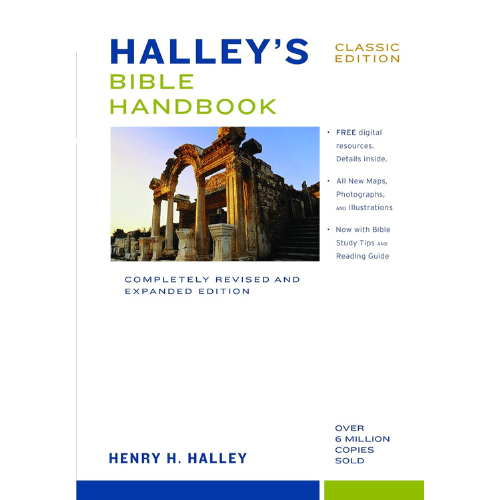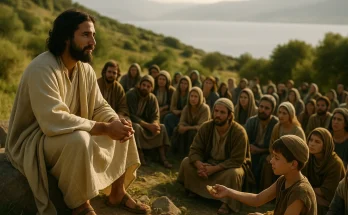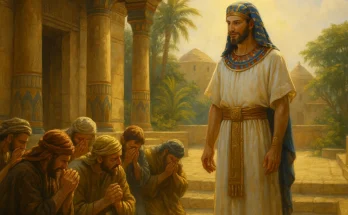Have you ever wondered if God is working in your life, even when He seems silent? The Book of Esther answers that question with a resounding yes! Though God’s name is never mentioned, His presence is woven throughout the story. We see how faith, favor, and perfect timing lead to miraculous deliverance.
Esther, a young Jewish woman, rises from obscurity to become queen of Persia. Yet, her position is not just for personal gain. When an evil plot threatens her people, she must choose between safety and sacrifice. With courage, she steps into her divine purpose, proving that God places us where we are for a reason.
Throughout the Book of Esther, we witness dramatic reversals, where the proud fall and the humble are lifted. Mordecai’s faithfulness, Haman’s downfall, and the Jews’ deliverance all reveal that God’s timing is never accidental. Even in times of uncertainty, He is always at work behind the scenes.
As we explore this powerful story, let’s consider how faith, favor, and divine timing shape our own lives. Could it be that God has placed us “for such a time as this”?
Writer of the Book of Esther
The author of the Book of Esther remains a mystery. While some believe Mordecai, a key figure in the story, wrote it, there is no definitive proof. Others suggest a Jewish scribe or historian from the Persian period carefully recorded the events. Although we may not know the writer, the book’s historical accuracy and attention to detail suggest firsthand knowledge or access to reliable sources.
More importantly, the Book of Esther is divinely inspired, preserved as part of Scripture to reveal God’s unseen hand at work. The absence of God’s name is striking, yet His presence is undeniable. Every twist in the story reminds us that He directs history according to His plan.
Regardless of who penned it, the message remains clear: God is always working, even when He seems silent. Through faith and obedience, we can step into His divine purpose, just as Esther did.
Date Written
Scholars estimate that the Book of Esther was written between 460 and 350 B.C. This places it during or soon after King Xerxes’ reign. Since the book accurately reflects Persian customs, it was likely written close to the events it describes.
Interestingly, there is no mention of Greek influence, which suggests it predates Alexander the Great’s conquest in 331 B.C. This detail helps confirm that the Book of Esther was written before Greek culture reshaped the ancient world.
Though we may not know the exact date, the book’s historical details align perfectly with Persian records. Because of this, we can trust its reliability. More importantly, its timeless message of faith and divine timing remains just as relevant today. Esther’s story reminds us that God works through history, placing His people exactly where they need to be. Even now, His plans unfold in ways we may not yet see.
To Whom Written
The Book of Esther was written primarily for the Jewish people, especially those living in exile under Persian rule. At that time, many Jews had returned to Jerusalem, but others remained scattered throughout the empire. They faced challenges in maintaining their identity and faith in a foreign land.
This book reminded them of God’s faithfulness, even when He seemed distant. It encouraged them to trust His unseen hand in times of uncertainty. Additionally, the Book of Esther explained the origin of the Feast of Purim, a joyous celebration of God’s deliverance.
Beyond its original audience, this book speaks to all believers. It teaches us that God’s timing is always perfect, even when we don’t understand it. Just as He protected His people then, He remains faithful to His promises today. Through Esther’s story, we are reminded that our circumstances never limit God’s ability to work in powerful ways.
Purpose of the Book of Esther
The Book of Esther was written to show God’s providence in protecting His people, even in the most difficult circumstances. Though they lived in a foreign land under a pagan ruler, God never abandoned them. He worked behind the scenes, orchestrating events to preserve His covenant people.
This book also teaches us about faith, courage, and obedience. Esther risked her life to stand for her people, reminding us that God places us where we are for a reason. Mordecai’s unwavering faith shows that trusting God, even when the future is uncertain, leads to victory.
Another purpose of the Book of Esther is to explain the origin of Purim. This annual festival celebrates God’s miraculous deliverance and reminds future generations of His faithfulness. More than just a historical account, this book encourages us to trust God’s timing. Even when He seems silent, He is always working for His people’s good.
Historical Context of the Book of Esther
The Book of Esther takes place in the powerful Persian Empire during the reign of King Xerxes I (486–465 B.C.). At this time, the Jewish people were living in exile, scattered throughout the vast empire. While some had returned to Jerusalem, many remained in cities like Susa, the Persian capital.
Living under Persian rule presented challenges. The Jews were a minority surrounded by foreign customs, officials, and religious beliefs. Maintaining their identity and faith was not easy. Unfortunately, tension between the Jews and other groups led to a dangerous plot against them.
Haman, a high-ranking official, sought to destroy the Jewish people simply because Mordecai refused to bow to him. His hatred led to an empire-wide decree calling for their annihilation. Yet, through God’s providence, Esther and Mordecai rose to a position of influence. The Book of Esther gives us a glimpse into this dramatic moment in history, showing how God preserved His people. Even in exile, He was still in control.
Key Themes in the Book of Esther
The Book of Esther is filled with powerful themes that still speak to us today. Though God’s name is never mentioned, His providence is evident in every twist and turn of the story. He orchestrates events to protect His people, reminding us that He is always at work, even when we cannot see Him.
Faith and courage shine brightly through Esther’s actions. She risked everything to approach the king, knowing her decision could cost her life. Yet, she stepped forward in faith, proving that God uses ordinary people to accomplish extraordinary things. Her boldness encourages us to trust Him, even when the odds seem impossible.
Another key theme in the Book of Esther is divine timing. Nothing happens by chance—every event unfolds at just the right moment. Mordecai’s rise to power, Haman’s downfall, and the king’s sleepless night all align perfectly to bring deliverance. This reminds us that God’s plans are always purposeful, even when we do not understand them.
Justice and reversal also play a major role. The very gallows Haman built for Mordecai became his own downfall. Meanwhile, the Jews, once condemned, were granted the right to defend themselves. This theme reassures us that God turns the plans of the wicked into victory for His people.
Lastly, the Book of Esther highlights the power of influence. Esther’s position as queen gave her the opportunity to change history. Though she was just one person, her bravery saved an entire nation. Her story reminds us that God places us in specific roles for a purpose. When we trust Him and step out in faith, He can use us in ways we never imagined.
Major Events/Stories in the Book of Esther
The Book of Esther is filled with dramatic moments, unexpected reversals, and powerful displays of courage and faith. Every event in this story reveals God’s unseen hand, working behind the scenes to protect His people.
Queen Vashti’s Refusal and Removal (Esther 1)
King Xerxes, ruler of the Persian Empire, hosts a grand banquet to display his wealth and power. During the celebration, he commands Queen Vashti to appear before his guests, but she refuses. Her defiance leads to her removal as queen, creating the opportunity for Esther to rise to prominence.
Esther Becomes Queen (Esther 2)
After Vashti’s removal, the king searches for a new queen. Among the many young women brought to the palace, Esther, a Jewish orphan raised by her cousin Mordecai, is chosen. However, Mordecai advises her to keep her Jewish identity a secret. God positions her in the palace long before the crisis unfolds.
Haman’s Plot Against the Jews (Esther 3)
Haman, a high-ranking official, is enraged when Mordecai refuses to bow before him. His pride and hatred drive him to seek revenge—not just against Mordecai, but against all the Jewish people. Haman convinces King Xerxes to issue a decree calling for their destruction, putting the Jews in grave danger.
Mordecai’s Plea and Esther’s Decision (Esther 4)
When Mordecai learns about the decree, he mourns publicly and urges Esther to intervene. Initially hesitant, she fears approaching the king uninvited, as it could cost her life. However, Mordecai reminds her, “Who knows but that you have come to your royal position for such a time as this?” Encouraged by his words, Esther boldly decides to approach the king, saying, “If I perish, I perish.”
Esther’s Banquet and Haman’s Downfall (Esther 5–7)
Esther wisely invites King Xerxes and Haman to two banquets. Meanwhile, Haman builds gallows to execute Mordecai. However, during a sleepless night, the king remembers Mordecai’s past loyalty and honors him instead. At the second banquet, Esther reveals Haman’s plot to destroy the Jews. Enraged, the king orders Haman to be executed on the very gallows he built for Mordecai.
The Jews Are Saved (Esther 8–10)
Although Haman is gone, his decree cannot be reversed. Instead, King Xerxes issues a new decree allowing the Jews to defend themselves. They defeat their enemies, securing their survival. To remember this victory, they establish the Feast of Purim, a celebration of God’s deliverance that continues today.
The Book of Esther reminds us that God is always working, even when we cannot see Him. Through faith and courage, He turns impossible situations into powerful testimonies of His divine providence.
Halley’s Bible Handbook, Classic Edition
The bestselling Bible handbook of all time with millions of copies sold, the Halley’s Bible Handbook makes the Bible’s wisdom and message accessible to everyone.
Theological Contributions From the Book of Esther
The Book of Esther offers powerful theological insights that deepen our understanding of God’s sovereignty, human responsibility, and divine justice. Even though God’s name is never mentioned, His presence is undeniable throughout the story.
God’s Sovereignty
Though God appears silent, He is actively at work behind the scenes. Every event—Esther’s rise to the throne, the king’s sleepless night, and Haman’s downfall—happens at just the right time. The Book of Esther reminds us that God is always in control, even when His hand is unseen.
Human Responsibility
While God orchestrates events, Esther and Mordecai must take action. Their faith-driven decisions play a crucial role in saving the Jewish people. This teaches us that God works through our choices, calling us to step out in faith and obedience.
Justice and Divine Reversal
The story of Esther highlights God’s perfect justice. Haman, who planned Mordecai’s execution, is instead hanged on his own gallows. The Jews, once sentenced to death, are granted victory. The Book of Esther reassures us that God brings justice in His perfect timing.
The Value of Fasting and Prayer
Before approaching the king, Esther calls for a fast, seeking God’s guidance. This act of dependence reminds us that fasting and prayer prepare us for life’s challenges. When we seek God first, He gives us the strength and wisdom to act.
The Book of Esther teaches us that God is always at work, guiding, protecting, and bringing justice, even when we cannot see His plan.
Special Consideration of the Book of Esther
One of the most unique aspects of the Book of Esther is that God’s name is never mentioned. This has sparked debates about its place in the Bible. However, despite this omission, God’s presence is evident in every detail of the story. His providence, timing, and guidance are woven throughout, proving that He is always at work behind the scenes.
Another important consideration is the Book of Esther’s connection to Purim. This Jewish festival, still celebrated today, commemorates the miraculous deliverance of God’s people. The book not only explains its origins but also emphasizes the importance of remembering God’s faithfulness through generations.
Additionally, Esther’s story reminds us that God works through ordinary people to accomplish extraordinary things. She was not a prophet, warrior, or ruler—just a young woman placed in the right position at the right time. Her courage and obedience encourage us to trust God’s purpose for our own lives, even when we cannot see the full picture.
Final Thoughts on the Book of Esther
The Book of Esther is a powerful reminder that God is always working, even when we cannot see Him. Though His name is never mentioned, His presence is undeniable throughout the story. Esther’s courage, Mordecai’s wisdom, and the miraculous reversals all reveal His divine hand at work.
This book teaches us that faith, favor, and divine timing go hand in hand. Esther’s willingness to risk everything reminds us that God places us where we are for a reason. Mordecai’s steadfast faith shows us that standing firm in truth brings victory in God’s perfect time.
Most importantly, the Book of Esther reassures us that God never abandons His people. Even in exile, He was guiding and protecting them. Today, we can trust that He is still in control, orchestrating events for our good and His glory. When we step out in faith, He moves in ways we never expect.
Frequently Asked Questions (FAQ) About the Book of Esther
1. Why is God’s name never mentioned in the Book of Esther? Although God’s name is absent, His presence is clearly seen throughout the story. The events unfold in ways that reveal His divine providence, showing that He is always working behind the scenes to protect His people.
2. What is the main message of the Book of Esther? The Book of Esther teaches us about faith, courage, and divine timing. It reminds us that God is in control, even when He seems silent. Esther’s story encourages us to trust Him and step forward in obedience, knowing He has a greater purpose.
3. What is the significance of Purim in the Book of Esther? Purim is a Jewish festival established in Esther 9 to commemorate the Jews’ deliverance from Haman’s plot. It is a time of celebration, remembering how God turned their sorrow into joy and preserved His people.
4. How does the Book of Esther demonstrate divine timing? Every event happens at just the right moment—Esther’s rise to the throne, the king’s sleepless night, and Haman’s downfall. This reminds us that God’s timing is never accidental but always purposeful.
5. What can we learn from Esther’s courage? Esther risked her life to save her people, showing that faith sometimes requires bold action. Her story encourages us to trust God’s plan, even when it involves great personal risk.





